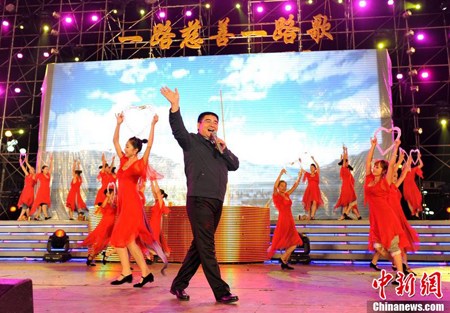(Ecns.cn) – China's philanthropy has witnessed a number of twists and turns since the "Guo Meimei Incident" in June, causing many charitable institutions to find themselves in a crisis of failing public trust. In such a troubled climate, renowned philanthropist Chen Guangbiao has used a characteristically flamboyant approach to charity that he hopes will inspire the country's wealthy to give.
Though he has received both praise and criticism, Chen has never lost confidence in his approach to helping the impoverished. In sharp contrast, government-run charity institutions are now finding it difficult to keep step.
To remedy the situation, scholars point out that charitable institutions should avoid the tendency to become mired in bureaucracy, while also strengthening standards and regulations to make the industry develop in a healthy direction.
High-profile philanthropy
On September 25, 2011, Chen Guangbiao held a solo concert in Bijie in southwest China's Guizhou Province, bringing with him 2,000 pigs, 1,000 goats and 113 farming machines, all to be donated to poor local families. According to local media, no tickets were needed to get in, and as long each person listened to the concert from start to finish, they would each be given a pig and a goat. Chen said that he would check back a month later to ensure that the donations had reached the hands of the farmers.
Chen quoted a traditional Chinese proverb, saying that it is better to teach others to fish than to give them fish, because they will fish for a lifetime with the skills. A pair of boars and sows is worth about two thousand yuan ($309.2) at present, he elaborated. After 10 months of cultivation, the pigs will give birth to piglets that will be worth much more. I want to help the farmers become rich, he said.
Earlier this year, after the Yingjiang earthquake in Yunnan Province, Chen practiced his style of "rogue philanthropy" by handing out cash to affected residents on the street. However, he also asked the people to hold up the money as he posed in photos with them, a move widely criticized as showing off.
Chen's generous and controversial hands have also extended beyond the Chinese mainland, in places such as Taiwan.
In January this year, Chen held a donation ceremony at a Taiwan auditorium where he doled out $250,000 in his signature red envelopes. He also donated money to social welfare groups and a school lunch program for low-income students, reported the Taiwan Times.
After Japan was hit by the disastrous 9.0-magnitude earthquake on March 11, 2011, Chen purchased 30 tons of relief materials and took them to the stricken country. Many argued that the only thing he cared about during the visit was how impressive it was, as he frequently showed flag-draped escorts and flag-pinned suits when taking pictures.
Chen Guangbiao was born in a poor family in Anhui Province where it was a constant battle to survive. His life is a classic tale of rags to riches. Now, as president of the Jiangsu Huangpu Renewable Resources Company and the "top philanthropist" of China, Chen has dedicated himself to charity work over the last ten years and donated more than 810 million yuan ($125.2 million).
Chen believes his behavior is a call for China's richest people to give away their fortunes.
But this approach to charity has been widely criticized, causing Chen to ask the public what they were doing when their country was faced with sudden disasters, and whether they should examine their own consciences. He added that high-profile philanthropy should not be criticized or compared with low-profile non-philanthropy, and he, as an individual, should not be seen as fully responsible for the problems of the current charity industry.


















